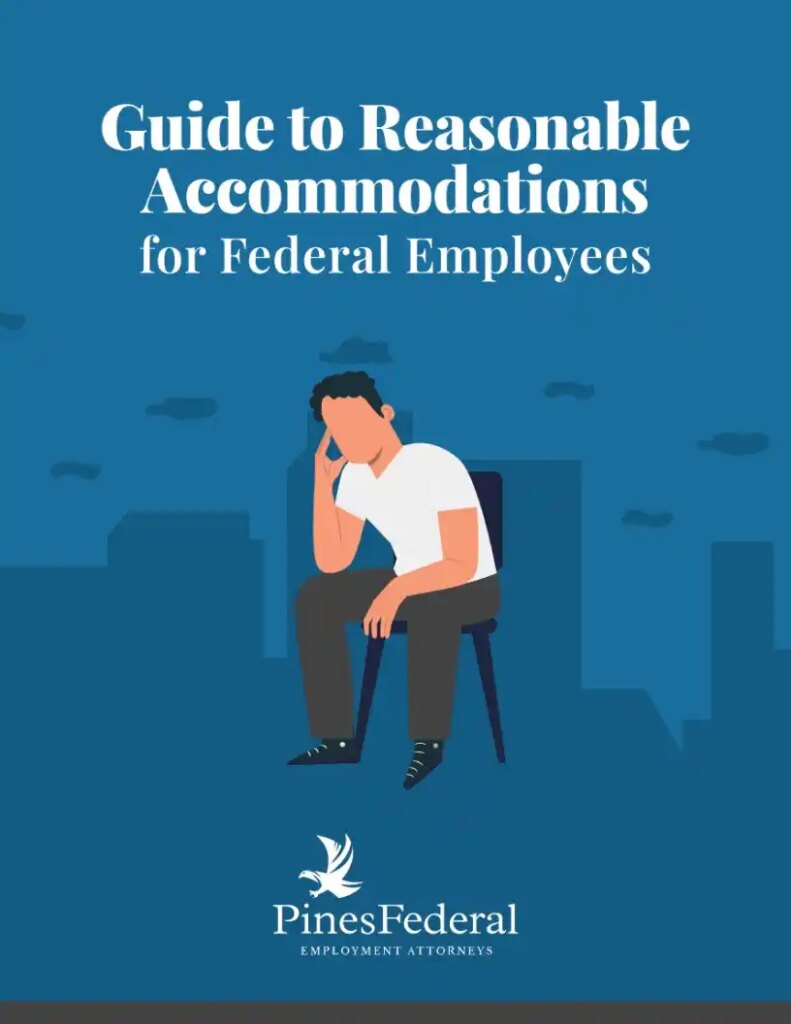
Federal employees are entitled to request a reasonable accommodation from their employer if they have a qualifying disability, thanks to the Rehabilitation Act of 1973 and Americans with Disabilities Act (ADA). Unfortunately, employers sometimes do refuse valid requests for reasonable accommodations.
Our nationwide federal employment reasonable accommodations attorneys explain what you can do if your reasonable accommodation was denied.
Learn how we can assist you by calling (800) 801-0598 or filling out our online form today.
Understanding Reasonable Accommodation
Before we discuss what you should do if you were denied reasonable accommodation, let’s explore the basics behind reasonable accommodation as a legal concept.
Reasonable accommodation is a crucial aspect of federal employment law. It works to ensure that individuals with disabilities have equal employment opportunities. It also helps them be productive members of the workplace.
Thanks to the Americans with Disabilities Act, reasonable accommodation is enshrined into law, meaning that employers have to provide reasonable accommodations to individuals with disabilities unless doing so would be an undue hardship.
The simple definition of a reasonable accommodation is an adjustment to some aspect of your job. It can include changes to the way you perform work. It can also refer to changes in your duties.
Examples of reasonable accommodations include things like:
- Modifying the physical layout of a workplace;
- Working from home (also referred to as telework or remote work)
- Providing technology that helps you work more effectively;
- Adjusting your work schedule in some way; and
- Changing your non-essential job duties.
Provided it helps you perform the essential duties of your position, your employer must provide reasonable accommodation. The only situation in which your employer may deny you reasonable accommodation is if the accommodation imposes an undue hardship on them. However, this is a relatively difficult standard for agencies to meet. Given that most agencies have millions of dollars in their budget, they can put many kinds of accommodations into practice.
The Interactive Process
The first thing you should do if you want to request reasonable accommodation is to engage in discussion with your employer about your request. In fact, your employer should reach out to you to learn more about your request.
After your employer reviews the accommodation request, they should obtain a written medical release from you. They may also ask you to provide appropriate documentation from your health care to determine the severity of your disability.
Once they have that information, human resources personnel should work with your supervisory team to discuss possible accommodations. Even if your agency decides that your requested accommodation is unworkable, they should provide an alternative accommodation that allows you to perform your duties.
Featured Case Result
WHAT HAPPENED: We negotiated a $150,000 settlement exclusive of fees for a border agent who was not accommodated and sustained serious injury as a result of their issued gun belt.
What Do I Do When My Employer Refuses My Reasonable Accommodation Request?
The denial of a reasonable accommodation request is a hard blow, and it’s normal to feel discouraged.
However, you don’t need to give up and roll over if your federal employer denied your reasonable accommodation request. Take action instead. If your employer refuses to provide you with a response to your reasonable accommodation request or if they denied the request, there are a few things you can do to help your case.
Step #1: Understand Why Your Federal Employer Denied Your Reasonable Accommodation Request
Despite the clear requirements of the law, employers still deny many reasonable accommodation requests. Common reasons for denial include the employer’s belief that the accommodation would be too costly, would be too difficult to implement, or would fundamentally alter the nature of the job.
At other times, an employer may also deny a reasonable accommodation request because they are not aware of the full range of accommodations that are available. This can occur when the agency lacks the knowledge or experience to fully understand the needs of individuals with disabilities and the accommodations that would be necessary to meet those needs.
Given those facts, you need to understand why your employer denied your request. Did they think it would be too expensive? Did they find that another accommodation would work better? Or did they not take your medical condition seriously? Knowing the reasoning behind the denial allows you to think about your path forward.
Step #2: Create a Paper Trail of Your Request
Sometimes, employers simply refuse to take action on existing requests. If you are encountering that situation, one simple response is to create evidence around your request.
For example, if your employer is ignoring your verbal requests, you should consider requesting a reasonable accommodation through a written letter or email.
Having a paper trail will help your attorney document your employer’s failure to take action when you requested a reasonable accommodation.
You can also notify your human resources department to ensure that there is more than one person aware of your reasonable accommodation request. Frequently, contacting your agency’s human resources department can bring about an acceptance of your reasonable accommodation request.
Step #3: Contact a Federal Employment Law Attorney
Once you have taken these steps, you need to get the assistance of an experienced federal employment attorney. This kind of attorney can help you understand your reasonable accommodation rights. They can also assess the facts of your case and help you navigate the legal process of pursuing a claim.
An attorney can assist you in several other ways. They can gather evidence on behalf of your cause and negotiate with your employer to resolve your complaint.
If negotiations fail, your attorney can file a complaint for you with the Equal Employment Opportunity Commission (EEOC). Your attorney can then argue on your behalf in a hearing before the EEOC or a federal district court.
Featured Case Result
We negotiated a $60,000 settlement for an Agency’s failure to accommodate our client’s respiratory issue which required a fragrance-free environment. – Read more client success stories…
Get In Touch With Our Team at Pines Federal
If your reasonable accommodation request was denied, our team at Pines Federal could review your case to determine if your employer has wronged you.
With more than 50 years of combined experience, our federal employment law attorneys provide exceptional legal services to a wide range of diverse individuals who hold federal occupations nationwide. We are backed by extensive experience and a track record of success.
If you are looking for skilled representation, contact us online or call (800) 801-0598 today.
[DOWNLOAD] Reasonable Accommodations for Federal Employees
